Zoom
Trash

Employing the Usefulness of the Useless, or: Examining the Relevance of a Philosophical Life. What Is A Modern Myth? I’ve had many discussions with people over the past few years about why myth is important.
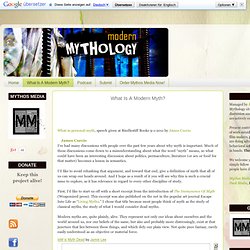
Much of these discussions come down to a misunderstanding about what the word “myth” means, so what could have been an interesting discussion about politics, permaculture, literature (or sex or food for that matter) becomes a lesson in semantics. I’d like to avoid rehashing that argument, and toward that end, give a definition of myth that all of us can wrap our heads around. And I hope as a result of it you will see why this is such a crucial issue to explore, as it has relevance in regard to every other discipline of study. First, I’d like to start us off with a short excerpt from the introduction of The Immanence Of Myth (Weaponized press). This excerpt was also published on the net in the popular art journal Escape Into Life as “Living Myths.” Consciousness: The Bridge Between Science and Religion. Peter Russell, Spirit of NowWaking Times Science and religion often seem poles apart–and in many ways they are.

But I believe the two can, and will eventually, be united, and their meeting point will be human consciousness. That we are conscious beings is the most obvious fact of our existence. Indeed, all we ever know are the thoughts, images, and feelings arising in our consciousness. Yet as far as Western science is concerned, there is nothing more difficult to explain. Tools for a Better Future. Neat Stuff Ecstasy Drug-Crazed Ravers Are Like Chemical Buddhas Published on April 4th, 2014 | by Jason Louv.

Religion, World Religions, Comparative Religion. Disembodied Erotomania. Do we live in a computer simulation? UW researchers say idea can be tested. News releases | Research | Science December 10, 2012 A decade ago, a British philosopher put forth the notion that the universe we live in might in fact be a computer simulation run by our descendants.
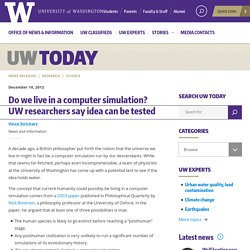
While that seems far-fetched, perhaps even incomprehensible, a team of physicists at the University of Washington has come up with a potential test to see if the idea holds water. The concept that current humanity could possibly be living in a computer simulation comes from a 2003 paper published in Philosophical Quarterly by Nick Bostrom, a philosophy professor at the University of Oxford. Is Life One Gigantic Computer Simulation? University of Washington scientists think they’ve found a way to test Nick Bostrom’s controversial 2003 theory. And now for a bit of news that you (and I) will almost certainly not understand: scientists at the University of Washington say they’ve devised a test that may prove whether or not the lives we live are actually just one giant computer simulation created by our future descendants. Yes, you read that right. The researchers are responding to a 2003 paper published in Philosophical Quarterly by Nick Bostrom, a philosophy professor at the University of Oxford, who posited that somewhere down the line humans will become smart enough (and computer processing powerful enough) to model entire universes, and that we might be one of them.
Muscular Christianity. Muscular Christianity is a Christian commitment to piety and physical health, basing itself on the New Testament, which sanctions the concepts of character (Philippians 3:14) and well-being (1Corinthians 6:19–20).[1][2][3] The movement came into vogue during the Victorian era and stressed the need for energetic Christian evangelism in combination with an ideal of vigorous masculinity. Historically, it is most associated with the English writers Charles Kingsley and Thomas Hughes, and in Canada with Ralph Connor, though the name was bestowed by others. Kingsley and Hughes promoted physical strength and health as well as an active pursuit of Christian ideals in personal life and politics. Muscular Christianity has continued itself through organizations that combine physical and Christian spiritual development.[4] It is influential within both Catholicism and Protestantism.[5] Origins[edit] The term "Muscular Christianity" became well known in a review by the clergyman T.
Influence[edit] Lucid Dreaming and Mental Illness. I got the weirdest phone call last week.
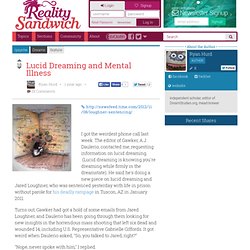
The editor of Gawker, A.J. Daulerio, contacted me, requesting information on lucid dreaming. Cases of Time Slips. A white Ford pickup pulled up to cattle pasture near Ponca City, Oklahoma, in early Fall 1971, and stopped at a gate.
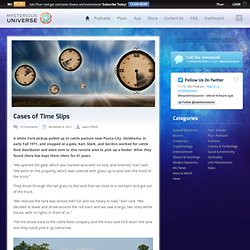
Karl, Mark, and Gordon worked for cattle feed distributor and were sent to this remote area to pick up a feeder. What they found there has kept them silent for 41 years. You Are Enough: Speaking Up without Blowing Up. “To be beautiful means to be yourself.

You don’t need to be accepted by others. You need to accept yourself.” ~Thich Nhat Hanh “I aim to please. “Life is But a Dream” Picture: Anonmoos (PD) “As sunlight obscures the stars by day so too does wakefullness blind us to the fact that we are still dreaming.” - Liber Kaos, Peter J Carroll.
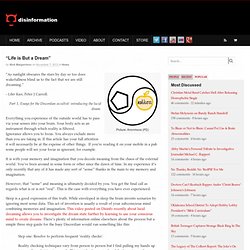
Part 1, Essays for the Discordian occultist: introducing the lucid dream. Newsweek panders to the deluded again. I’ve got to wonder who is responsible for this nonsense, and how it gets past the staff at Newsweek.
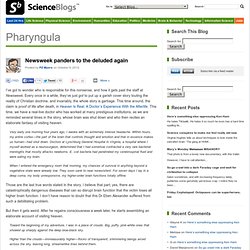
Every once in a while, they’ve just got to put up a garish cover story touting the reality of Christian doctrine, and invariably, the whole story is garbage. The Religious Worship Of Robotic Machines As Nature Perfected. Menrva Minerva Wisdom Goddess Arts Goddess Inventor Goddess Etruscan Goddess roman goddess pagan gods and goddesses Roman Gods and goddesses wiccan wicca paganism pagan Thalia Took. Against Self-Ownership. Are You A Bit Of A Loser? Don't Worry, You're Probably Really Creative. Meditations on Disbelief - Jeannie Choi. Reincarnation as a Plausible Explanation.
13 more things that dont make sense. Cookies on the New Scientist website close Our website uses cookies, which are small text files that are widely used in order to make websites work more effectively.
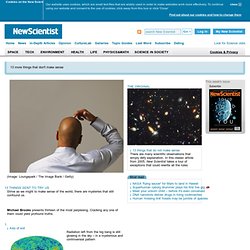
To continue using our website and consent to the use of cookies, click away from this box or click 'Close' Zizek!